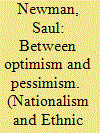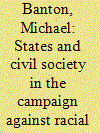| Srl | Item |
| 1 |
ID:
116229


|
|
|
|
|
| Publication |
2012.
|
| Summary/Abstract |
The Oslo Accords failed to end Israeli-Palestinian violence and led to a final settlement of the conflict. This article examines Israeli attitudes toward conflict resolution and argues that the peace process, despite its setbacks, has increased Israeli support for certain concessions. While support for the "Oslo Process" may have declined, Jewish Israeli acceptance of the creation of a Palestinian state has risen dramatically. Israelis remain committed to continuing the peace process, they just remain highly skeptical that the process will succeed. The article examines the sources of this skepticism. Both lack of trust in Arab aspirations and religiosity are the primary determinants of Israeli unwillingness to make concessions for peace. Trust is tied to present conditions rather than past conditions of conflict. Thus, if trust could be rebuilt, Israeli Jews would be considerably better poised to make political and territorial concessions for peace than they were at the start of the "Oslo Process." Although the relative fertility rates of Orthodox Jews, compared to secular Jews, might undermine long-term support for peace, this might be counterbalanced by the growing dovishness of young secular Russians socialized in Israel.
|
|
|
|
|
|
|
|
|
|
|
|
|
|
|
|
| 2 |
ID:
116228


|
|
|
|
|
| Publication |
2012.
|
| Summary/Abstract |
Political institutions are socially constructed rules manifesting the preferences and strategic interactions of key actors at decisive moments. We investigate a contentious episode of institutional change in a divided society: the adoption of direct presidential elections in Turkey, approved by referendum in October 2007. Process tracing and regression analyses demonstrate that Kurdish politicians and voters in Turkey supported this reform. However, direct elections are unlikely to increase Kurds' leverage over choosing Turkey's presidents and may even diminish it. Kurdish support for direct elections is better explained by the reform's broader anticipated impacts on the structuring of state power.
|
|
|
|
|
|
|
|
|
|
|
|
|
|
|
|
| 3 |
ID:
116227


|
|
|
|
|
| Publication |
2012.
|
| Summary/Abstract |
This article explains the impact of substate nationalism on the political dynamic surrounding ethnic kin migration through a case study of Sri Lankan Tamil refugees in the southern Indian State of Tamil Nadu. Examples drawn from the migration studies literature identify ethnic kinship between refugees and host as an indicator of favorable reception and assistance. While this expectation is borne out to an extent in the Tamil Nadu case, it is tempered by a period of hostility following the 1991 assassination of former Indian Prime Minister Rajiv Gandhi by an LTTE suicide bomber, when the refugees were figured as a disruptive and dangerous presence by Tamil Nadu's political elites. A version of the "triadic nexus" model of kin state relations, reconfigured to accommodate the larger political unit within which the substate nationalism is incorporated, is proposed as a framework of analysis for these events. This can better account for Tamil Nadu's substate ethnonationalist elite's movement between expressions of coethnic solidarity with the refugees and the more hostile, security-focused response postassassination.
|
|
|
|
|
|
|
|
|
|
|
|
|
|
|
|
| 4 |
ID:
116226


|
|
|
|
|
| Publication |
2012.
|
| Summary/Abstract |
Despite continual territorial division in Cyprus both the EU and CTP-led Turkish-Cypriot governments tried to normalize intercommunal relations. To this end, the CTP government revised radically Cypriot history textbooks. Although this revision received diverse political reactions, the pupils' perceptions of intercommunal relations through history teaching have not been examined so far. This article examines the results of revisions and argues that perceptions of intercommunal relations are significantly correlated with teachers' politico-ideological orientations. It also argues that pupils from native families are more likely to accept novel ideas of the new textbooks than the pupils from immigrant families. The existing process of political socialization of pupils restricts further conciliatory attitudes in intercommunal relations. The responses of Cypriot history teachers in secondary schools and a selected sample of their students to a questionnaire constitute the data.
|
|
|
|
|
|
|
|
|
|
|
|
|
|
|
|
| 5 |
ID:
116225


|
|
|
|
|
| Publication |
2012.
|
| Summary/Abstract |
Since 1970, states that are parties to the International Convention on the Elimination of Racial Discrimination have been reporting on the implementation of their treaty obligations. In the first two decades, states assumed the right to define the issues. Because of changes in the practice of the treaty-monitoring body, nongovernmental organizations in the more democratic states have been increasingly able to contribute alternative perspectives. This has been a significant step in the development of global civil society.
|
|
|
|
|
|
|
|
|
|
|
|
|
|
|
|